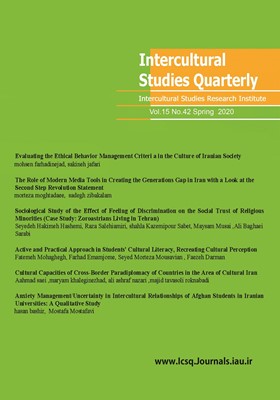Sociological Study of the Effect of Feeling of Discrimination on the Social Trust of Religious Minorities (Case Study: Zoroastrians Living in Tehran)
Subject Areas : INTERCULTURAL STUDIES QUARTERLYSeyedeh Hakimeh Hashemi 1 , Raza Salehiamiri 2 , shahla Kazemipour Sabet 3 , Maysam Musai 4 , Ali Baghaei Sarabi 5
1 - PhD Student, Sociology, Economics and Development, Science and Research Branch, Islamic Azad University, Tehran, Iran
2 - Assistant Professor of Cultural Management, Science and Research Branch, Islamic Azad University, Tehran, Iran.
3 - Professor, Department of Social Planning and Development, University of Tehran, Tehran, Iran.
4 - Associate Professor, Department of Demography, University of Tehran, Tehran, Iran.
5 - Assistant Professor, Department of Sociology, Islamic Azad University, Central Tehran Branch, Tehran, Iran.
Keywords: institutional trust, interpersonal trust, Generalized trust, Feeling of discrimination, Zoroastrian community in Tehran,
Abstract :
Trust is the basic preconditions for economic, social, cultural and political development of any society causes and Iranian society is a religiously diverse society and the social structure in Iran is with the phenomenon of ethnic, religious and religious pluralism. Therefore, the main purpose of this study is a sociological study of the effect of social discrimination on social trust in the Zoroastrian community in Tehran. In the present study, the theories of Putnam, Giddens, Coleman, Sztompka, Offe, Rogers and Uslaner have been selected as the theoretical framework of the research. The research method in this research is survey, multi-stage cluster sampling and data collection tool is a questionnaire. The statistical population of the study consists of all Zoroastrians living in Tehran, which according to the statistics of the Zoroastrian Association of Tehran is about seven thousand people and the sample size using the Cochran's formula is equal to 191, which was collected 210 questionnaires to be more reliable. The results show that 20/9% of the respondents have a low level, 52/4% have a moderate level and 26/7% have a high level of social trust. Also, findings show that in the Zoroastrian community of Tehran, the individual characteristics of the respondents did not affect their social trust; but the variables of socio-economic status and feeling of discrimination have affected the level of social trust of Zoroastrians.
ازکیا، مصطفی و احمدرش، رشید ( 1394 ). توسعه و مناقشات پارادایمی جدید (جلد دوم)، تهران: انتشارات دانشگاه آزاد اسلامی، واحد علوم و تحقیقات.
افتخاری، اصغر ( 1383 ) اقلیتگرایی دینی؛ طراحی یک چارچوب تحلیلی، تهران: تمدن ایرانی.
اوجاقلو، سجاد و زاهدی، محمدجواد (1384)، « بررسی اعتماد اجتماعی و عوامل مؤثر بر آن در بین ساکنان شهر زنجان»، مجله جامعه شناسی ایران، دوره ششم، شماره 4، 92- 125
پاتنام، رابرت ( 1380 ) دموکراسی و سنت های مدنی، ترجمهی محمد تقی دل افروز، تهران: انتشارات روش.
پناهی، محمدحسین و شایگان، فریبا ( 1386)، «میزان دینداری بر اعتماد سیاسی »، فصلنامه علوم اجتماعی، دوره 14 ، شماره 37 ، 73-108
زتومکا، پیوتر ( 1384 )، اعتماد یک نظریهی جامعه شناختی، ترجمه ی فاطمه گلابی،تبریز: نشر ستوده.
رضایی حسن آبادی، محمد ( 1390 )، ارزیابی عوامل موثر بر ارتقاء اعتماد اجتماعی مردم نسبت به سمن های (سازمان های مردم نهاد، NGO) مذهبی شهرستان یزد، پایان نامه کارشناسی ارشد مدیریت امور فرهنگی و برنامه ریزی، دانشگاه آزاد اسلامی واحد علوم و تحقیقات، دانشکده علوم انسانی و اجتماعی.
ریتزر، جورج ( 1395 ) نظریه جامعه شناسی در دوران معاصر، ترجمهی محسن ثلاثی، تهران: انتشارات علمی.
سراج زاده، سید حسین، مومنی، سمیه و درویشی، هادی ( 1397)، « بررسی جامعه شناختی زیست اجتماعی زرتشتیان شهر تهران به عنوان یک اقلیت مذهبی »، فصلنامه مطالعات و تحقیقات اجتماعی در ایران، دوره هفتم، شماره 3، صص 522-497
صالحی امیری، سید رضا ( 1388 ) مدیریت منازعات قومی در ایران، تهران: مرکز تحقیقات استراتژیک مجمع تشخیص مصلحت نظام.
غفاری، غلامرضا (1386)، « اعتماد اجتماعی خاصگرایانه و تعمیمیافته (مطالعه موردی دو محلۀ نازی آباد و یوسف آباد شهر تهران) »، پژوهشنامه علوم اجتماعی گرمسار،دانشگاه آزاد اسلامی واحد گرمسار، سال دوم، شماره 2، صص 198-181
غلامی، محمدرضا و علیزاده، رضا(1396)،« تحلیل جامعه شناسی مفهوم غرور ملی در ایران»، فصلنامه مطالعات ملی، دوره 18، .4(72)، 119-136
کلمن، جیمز ( 1390 ). بنیادهای نظریه اجتماعی، ترجمهی منوچهر صبوری، تهران: نشرنی
گیدنز، آنتونی ( 1398 ). تجدد و تشخص، ترجمهی ناصر موفقیان، تهران: نشر نی.
گیدنز، آنتونی ( 1394 ). پیامدهای مدرنیت، ترجمهی محسن ثلاثی، تهران: نشر مرکز.
محمدی، جمال و زنگنه، مهدی ( 1392) « سنجش عوامل موثر بر اعتماد شهروندان به شهرداری؛ مورد مطالعه شهروندان شهر نیشابور»، مجله جغرافیا و برنامهریزی محیطی، سال 24 ، پیاپی 49 ، شماره 1، 155-170
مرادی، سالار ( 1396 ). عوامل موثر بر اعتماد سیاسی در ایران پس از انقلاب اسلامی. رساله دکتری علوم سیاسی مسائل ایران، دانشگاه علامه طباطبایی، دانشکده حقوق و علوم سیاسی.
موسوی، میرطاهر(1384) « تحلیل مشارکت اجتماعی در تهران، رویکرد خرده فرهنگ دهقانی راجرز»، فصلنامه رفاه اجتماعی،سال پنجم،شماره 19 ، 301-330
وثوقی، منصور و آرام، هاشم (1388) « بررسی اعتماد اجتماعی و عوامل مؤثر بر آن در شهر خلخال (استان اردبیل)» پژوهش نامه علوم اجتماعی، سال سوم، شماره 3، 133-153
Alesina, A. & La Ferrara E. (2000). The Determinants of Trust. NBER Working Paper, No. 7621
Bolourchi, N. (2018). The Sacred Defense: Sacrifice and NationalismAcross Minority Communities in Post-Revolutionary Iran. Journal of the American Academy of Religion, Vol. 86, No. 3. 724–758
Cecolin, A. (2016). Iranian Jews in Israel Between Persian Cultural Identity and Israeli Nationalism, I.B. Tauris & Co. Ltd London, NewYork
Deihey, J. (2003). Lebensbedingungen und Wohlbefinden in Europa. In Statistiches Bundesamt (ed.) Datenreport, Bundeszentrale fur politische.Bildung: Bonn
Foltz, R. (2011). Zoroastrians in Iran: what future in the homeland?. The Middle East Journal, 65/1. 73–84
Putnam, R. (1993). Making Democracy Work Civic Traditional in Modern Italy. Princton: princton University press
Stewart, S. (2018). Voices from Zoroastrian Iran: Oral Texts and Testimony (Vol. I: Urban Centres). Wiesbaden: Harrasowitz Verlag. (Göttinger Orientforschungen)
_||_


